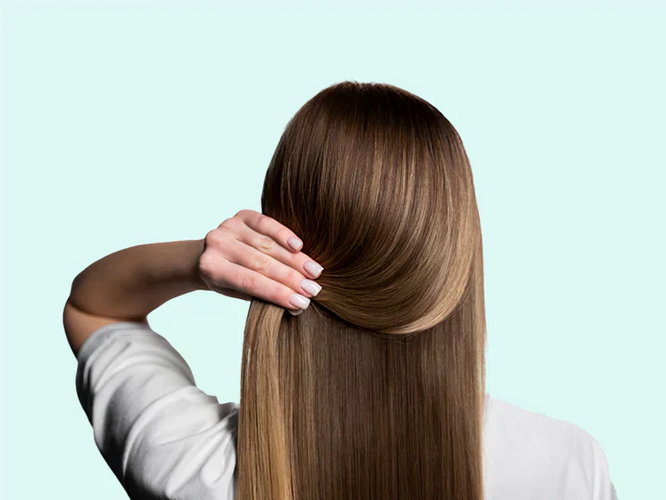- What does biotin do to your hair and body?
- How does biotin stimulate hair growth?
- Is biotin good for hair growth? What scientists say
- Symptoms of biotin deficiency
- Biotin supplements: are they necessary?
- Foods rich in biotin
- When can you expect results from biotin products?
- Neofollics Hair Growth Supporting Tablets: more than just biotin
- Possible side effects of biotin
- Conclusion: is biotin a good idea for your hair?
It’s well-established and widely known that biotin is essential for maintaining healthy hair and nails. That’s why it’s often marketed as a ‘hair vitamin’. But does biotin stimulate hair growth, or is this mostly clever marketing aimed at people’s insecurities? What real evidence supports the use of biotin? Where’s the nuance? And what can you do yourself?
In this article, we explore the facts about biotin and hair growth, offering honest answers, practical advice, and a natural solution that goes beyond biotin alone.
What does biotin do to your hair and body?
Biotin (vitamin B8) is a vital nutrient for the human body. It plays a role in several key processes, such as:
- Converting food into energy
- The production of keratin, the primary structural protein in hair
- Maintaining healthy skin, hair, and nails
Unlike some vitamins, our bodies don’t produce biotin. We must obtain it from food. Thankfully, a deficiency is rare when eating a varied and balanced diet. But if a deficiency does occur, the first signs usually appear in your hair, nails, or skin.
How does biotin stimulate hair growth?
Biotin supports keratin production, which strengthens the hair and encourages healthy growth. If your biotin levels are low, hair may become weak, thin, or brittle and in such cases, biotin supplementation can help reverse this.
Because of this role, biotin is often included in hair care products and supplements. But it’s important to know: biotin is most effective when there's a deficiency.
If you're already getting enough biotin, taking more will likely have little or no additional effect.
"Keratin = the protein that makes up the majority of your hair. Biotin helps your body produce it, but only to a certain point."
Is biotin good for hair growth? What scientists say
According to scientific research:
- Biotin can stimulate hair growth if a deficiency exists.
- If you already consume enough biotin, added supplementation will likely have little effect.
Some studies show improvements in hair growth, but these usually involve combination supplements, with ingredients like zinc, selenium, or plant extracts included alongside biotin.
That’s why, when biotin intake is already adequate, it’s more sensible to choose a hair supplement that addresses multiple causes of hair loss, with biotin as part of a broader formula.
Example: Neofollics Hair Growth Supporting Tablets contain biotin, selenium, and zinc all contributing to healthy hair maintenance.
Symptoms of biotin deficiency
Biotin deficiency is uncommon but not impossible. If it occurs, it may lead to:
- Hair thinning or hair loss
- Brittle or splitting nails
- Red, scaly rashes (often around the mouth or nose)
- Fatigue or irritability
- In severe cases: muscle weakness, tingling, or mood changes
Risk groups include smokers, vegans, people with gut issues, and pregnant women.
Biotin supplements: are they necessary?
Whether you need a biotin supplement depends on your personal situation. In most cases, you get enough from food. While biotin is important, more is not always better.
A supplement may be useful if:
- You have a confirmed or suspected deficiency
- Your diet is limited or unbalanced
- You experience hair loss without a clear cause
- You’re pregnant or recovering after childbirth
Still wondering, does biotin vitamins help hair growth in general? It may help, but primarily when there’s a deficiency. Hair loss can have multiple causes, so it’s important to understand the root of the problem. If you're unsure, speak to a doctor, dermatologist, or dietitian.
Foods rich in biotin
Want to increase your biotin intake naturally? Review your eating habits or keep a food diary for a week. Compare it to this list of biotin-rich foods:
- Eggs (especially the yolk)
- Avocados
- Almonds, walnuts, sunflower seeds
- Salmon, tuna
- Broccoli, spinach, cauliflower
- Dairy products (milk, yoghurt)
- Whole grains
- Bananas, raspberries
If you eat a balanced and varied diet, you’re likely getting enough. But here’s an important note: raw egg whites contain a protein called avidin, which binds to biotin and prevents your body from absorbing it. In essence, avidin "disables" the biotin, potentially leading to a deficiency if consumed regularly over time.
When can you expect results from biotin products?
Hair grows slowly, about 1 cm per month on average, so don’t expect overnight results.
Typical timeline when using biotin supplements:
- 0–4 weeks: No visible difference yet
- 4–12 weeks: First subtle improvements
- 3–6 months: Noticeable changes in hair volume or texture
If after six months you see no change, biotin may not be the right solution for your situation. Hair loss has many potential causes including stress, hormones, and genetics.
People with hereditary hair loss, for example, may need more patience. In advanced stages of baldness, it may already be too late for biotin to help.
Important advice: If hair loss runs in your family, start early with products that support hair growth. This can help preserve your hair longer and delay the progression of thinning.
Neofollics Hair Growth Supporting Tablets: more than just biotin
If you’re serious about addressing hair loss, you need more than just biotin. That’s why Neofollics Hair Growth Supporting Tablets were developed.
They offer a complete formula with ingredients that stimulate hair growth through different mechanisms, including:
- Biotin
- Zinc & Selenium
- Saw Palmetto & Green Tea
- L-Cysteine & Taurine
- Red Clover & Nettle
These tablets are suitable for both men and women and target multiple causes of hair loss at once.
Explore Neofollics Hair Growth Supporting Tablets and discover what they can do for your hair.
Possible side effects of biotin
Biotin is generally safe when taken at standard doses. Still, there are a few things to keep in mind:
- Extremely high doses may interfere with lab test results
- It can cause mild nausea in sensitive individuals (especially when taken on an empty stomach)
- Rarely, it may trigger skin reactions or interact with certain medications
If you’re taking biotin supplements, always inform your doctor before undergoing blood tests.
Biotin is water-soluble, so any excess is excreted through urine, which means the risk of accumulation is low.
Conclusion: is biotin a good idea for your hair?
Biotin is an important vitamin that supports healthy hair, especially when a deficiency is present. However, for most people, such a deficiency is unlikely. In those cases, taking additional biotin will not always lead to visible improvements.
That’s why it’s often more effective to choose a broader supplement that addresses multiple causes of hair loss. These offer support not only through biotin, but also through other ingredients that work together to promote hair growth.
Start using these kinds of supplements early, especially if hair loss runs in your family. Early support can help you maintain your hair for longer and slow down the progression of hair thinning.
This information does not replace professional medical advice. If in doubt, always consult a doctor or specialist.













